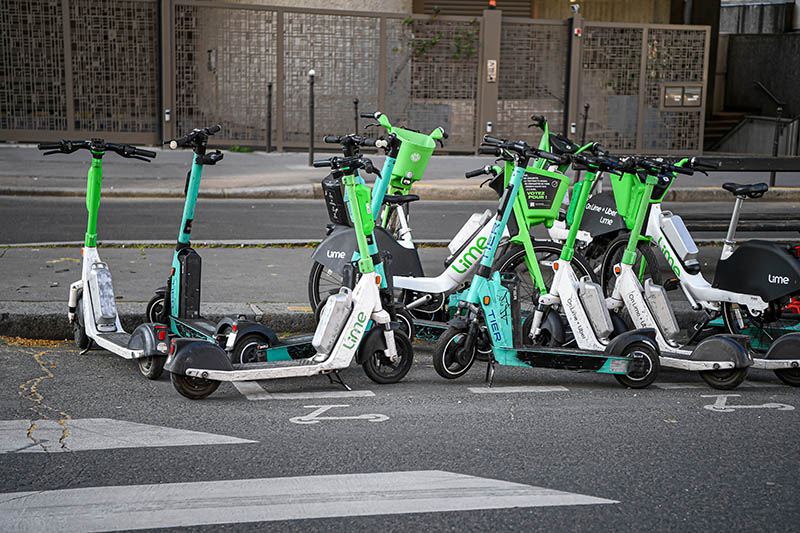Paris has become the first European capital to outlaw rental e-scooters. Deputy Mayor David Belliard has said the ban, which came into effect on 1 September 2023, is about opting for peace on the city’s streets: “We’re choosing to simplify and declutter the public space.”
In our research we found that most don’t actually know what the law says about right-of-way, speed limits and proper parking, not to mention the fact that you are required, at a minimum, to have a provisional driving licence.
Self-serve rental e-scooters offered on the so-called ‘free-floating’ market were introduced to the French capital in 2018 by Mayor Anne Hidalgo. One year and 20,000 scooters later, however, Hidalgo had changed her mind.
First she banned them on pavements, citing “anarchy”. “Without laws to reinstate order,” she said in 2019, “we could see 40,000 e-scooters in Paris by 2020.”
The most recent ban, meanwhile, has been introduced in response to a city-wide referendum Hidalgo held in April 2023, which saw nearly nine in 10 vote against the vehicles (the referendum has not been without controversy, since only 103,000 of Paris’s 2.1 million residents turned out to vote).
E-scooter rentals first emerged in the US when Florida-based micromobility operator Bird set up shop in Santa Monica, California, in 2017. In the UK, local authorities and counties across England began 12-month pilot rental schemes in 2020.
Many have repeatedly extended these trials but not the county of Kent. In September 2022, Kent County Council’s Cabinet Member for Transport, David Brazier, said he had decided to end the pilot “before someone was seriously hurt”. Like Hidalgo, he cited people not abiding by the rules.
Recent research I conducted with colleagues at Nottingham Trent University suggests the problem isn’t that riders are purposefully flouting the law. We have found that most don’t actually know what the law says about right-of-way, speed limits and proper parking, not to mention the fact that you are required, at a minimum, to have a provisional driving licence.
Most riders don’t intentionally break the law
In 2022, we surveyed 380 participants on their e-scooter riding habits. We also assessed 243 participants on their knowledge of the current relevant legislation. These participants, from across the UK, were invited to take part via an online study.
We used a number of riding scenarios to explore whether, when informed about the laws, riders would be more or less inclined to engage in illegal riding behaviour.
According to the latest report issued by the Department for Transport for the year ending June 2022, since the introduction of e-scooters in the UK in 2020, there have been 1,349 recorded collisions, 1,437 casualties, and 12 deaths.
We found that most people who use e-scooters (53%) do not know what the law says about permitted speed limits and designated parking areas. While the majority of riders we assessed were aware they are allowed to ride e-scooters on cycle lanes, they did not know where to park them. They also tended to overestimate the e-scooter speed limit.
Crucially, we found that riders, for the most part, are not breaking the law intentionally. We showed them video clips filmed from the rider’s perspective and asked them to indicate what their own course of action would be in that situation.
Around 46% of riders reported that if they knew what the rules were, they wouldn’t break them. Only about 9% admitted they would still engage in illegal riding practices even if they were aware.
The findings from our survey show that the most frequent violations involved tandem riding and riding on pavements (approximately 60% of riders). Many of the riders we interviewed were, in fact, unaware that riding on pavements in the UK is – and always has been – prohibited. These were followed by mobile phone use and riding through red lights (around 20% of riders).
When e-scooters were introduced in 2017, they were described as user-friendly modes of urban transport, a constructive effort to implement micromobility and ease congestion on city streets. Research suggests, however, that unregulated riding behaviour can lead to collisions and injury.
According to the latest report issued by the Department for Transport for the year ending June 2022, since the introduction of e-scooters in the UK in 2020, there have been 1,349 recorded collisions, 1,437 casualties, and 12 deaths.
What UK law says about e-scooters
The legislation governing the use of e-scooters is not a matter of individual interpretation, hence the need for a provisional licence. Contravening it can see you incur fines, get penalty points on your licence or have your scooter impounded.
In the UK, to ride a public rental e-scooter, you need at least a provisional driving licence. You are authorised to ride them on roads (but not motorways) and designated cycle lanes. This includes bus lanes that bear a cycle symbol. You are not allowed to ride them on pavements.
The e-scooter speed limit is 15.5mph. You are prohibited from riding in tandem, with another person, or from using your mobile phone. As with any other mode of transport, you should not ride under the influence of alcohol or drugs.
It is legal to purchase a private e-scooter – and over 1 million people are estimated to be using them. However, you are not allowed, by law, to ride one on a public road. Public e-scooters, which are identifiable by the rental logo and colour scheme – come with motor insurance, provided by the operator.
Our survey found that people mainly use e-scooters to replace walking or for fun. The law makes clear, however, that these vehicles should not be treated as toys.
The legislation governing their use is not a matter of individual interpretation, hence the need for a provisional license. Contravening it can see you incur fines, get penalty points on your licence or have your scooter impounded.
But this is not just about avoiding penalties. Not knowing the rules shapes how we ride, which in turn puts our safety – and that of the people using the city around us – at risk.
This article first appeared on The Conversation, and is republished under a Creative Commons Licence; the original can be read here.
About the Author
 Dr Petya Ventsislavova Patrova is Senior Lecturer in the Department of Psychology at Nottingham Trent University, specialising in transport psychology. Her applied research primarily focuses on hazard perception in driving, and she is dedicated to improving hazard perception and prediction skills in both UK and international drivers. She collaborates closely with various government departments to identify effective strategies for tailoring hazard perception testing to suit the specific requirements of individual countries and their driving evaluation processes, and evaluates the development of training resources designed to encourage the safe implementation of micromobility.
Dr Petya Ventsislavova Patrova is Senior Lecturer in the Department of Psychology at Nottingham Trent University, specialising in transport psychology. Her applied research primarily focuses on hazard perception in driving, and she is dedicated to improving hazard perception and prediction skills in both UK and international drivers. She collaborates closely with various government departments to identify effective strategies for tailoring hazard perception testing to suit the specific requirements of individual countries and their driving evaluation processes, and evaluates the development of training resources designed to encourage the safe implementation of micromobility.
Picture © Victor Velter / Shutterstock


